Last weekend’s episode of The Legend of Korra left me furiously disappointed for a multitude of reasons, but one element in particular threw the show’s failures into sharp relief: the extended sequence of Varrick’s propaganda film in support of the Southern Water Tribe, featuring Bolin playing Nuktuk, Hero of the South.
The film sequence itself was beautifully realised, but its place within the episode, and that episode’s place within the season, reminded me powerfully of the last time we saw characters in this universe watching themselves portrayed: back in Book 3, Episode 17 of Avatar: The Last Airbender, with “The Ember Island Players.”
Unfortunately, the differences between the episodes speak volumes about everything that’s gone wrong with Legend of Korra.
“The Ember Island Players” was one of the most sophisticated and beautifully crafted episodes of Avatar: The Last Airbender. Aang, Katara, Sokka, Zuko, Toph, and Suki discover that they and their exploits around the world have become the subject of a play being performed that evening, and decide to attend. We watch our protagonists watching representations of themselves—representations which are in-world responses to the characters but that ironically draw on fan reception of the show—and see them respond to those representations with outrage, humour, sadness, and introspection.
Katara is shocked to see herself being played by a buxom adult who’s constantly weeping and giving speeches about hope. Sokka hates that his actor’s jokes are bad. Aang hates that he’s being portrayed as a flighty prankster—by a woman. Zuko hates that he’s shown to be stiff and humourless. Toph, on the other hand, loves that she’s being played by an enormous, muscle-bound man.
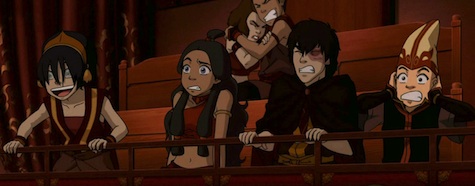
Of course the game of these representations is that they are aspects of the characters. The problem is not that the portrayals are categorically untrue, but that they are slivers of the characters that have been exaggerated in order to represent—and, consequently, obscure—them as wholes. Katara does talk about hope a lot, but she is also kind, caring, supportive, and fierce; Sokka does have a corny sense of humour, but he’s also creative, a brilliant strategist, and determined warrior. Aang does love to have fun and is indeed still a child, but he is also carrying a world’s worth of responsibility on his shoulders and struggling with the reality of reconciling his pacifism with everyone’s expectation that he not only defeat, but kill the Fire Lord. Zuko is absolutely stiff and humourless, but he has suffered through an abusive childhood, the rejection of everything he was taught to revere, and is wracked with guilt over his betrayal of Iroh. And while Toph has certainly demonstrated her ability to best big strong guys in combat, one could argue that she embraces that representation because it supersedes the one she has lived with all her life: that of being seen as limited and fragile because of her blindness. In reducing
Toph’s character to a man’s physical strength, the stage representation has (accidentally) given her a triumph over the different, more hurtful representation of herself as a delicate, helpless little girl.
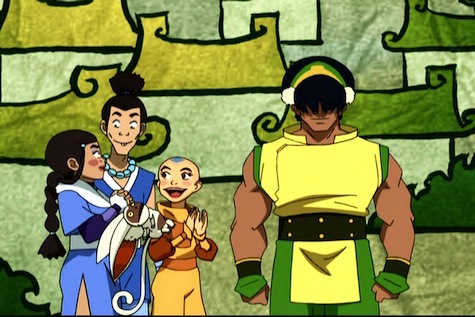
Throughout the episode, we see the characters confront these representations and discuss them amongst each other, navigating the failures and successes of each other’s portrayals in different ways, and learning something about how they see each other as well. The episode is a storytelling triumph, building a web of interaction that feels four-dimensional as it comments on audience, performance, and reception in layered and complex ways. Numerous essays have been written about it, and I could go on at length about its many felicities while only scratching the surface of what it succeeds in achieving.
Which brings me, sadly, to Legend of Korra and the portrayal of Bolin in “The Sting.”
With each “Book” being given only 12 episodes (as compared to A:tLA’s 20), one expects that LoK would be somewhat more limited in its scope, and that the characters would need to be painted with broader strokes than in A:tLA. But instead, each successive season has suffered replicative fading, gradually losing detail and complexity in its characters and world-building. Effectively, everything positive about Bolin from last season—the warmth and devotion to his only remaining family member, his positive attitude, his friendly openness, his kindness—have been reduced to a farcical caricature. He’s received the Ember Island Players’ treatment at the hands of the writers of the show.
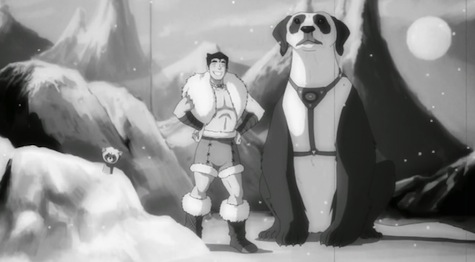
So it is ironically appropriate that Bolin, who has been so reduced, should become the actor playing Nuktuk: an unrealistic—if not outright fetishistic—depiction of a Southern Water Tribe warrior, baring skin in the snow and performing an appearance of water-bending. Not only is Nuktuk a fanciful invention, there is a sense in which he is partly a perverted depiction of the Avatar, given the Southern origin and presence of a polar bear dog (well, “Arctic Panda”) sidekick.
Just as with “The Ember Island Players,” we see Bolin watching the depiction in question—but his role in it mirrors the role he’s being given in the show. Instead of watching the film itself, the position of his seat and Varrick’s assertion that he sees “a star being born” are invitations to watch the audience and its reaction to the film.
While this is certainly effective at conveying the film’s role as cheap propaganda—and while I will say again that the film itself is a brilliantly stylised tribute to early cinema and is definitely one for Legend of Korra’s “win” column—it also drives home what a parody of himself Bolin has become: one incapable of separating fantasy from reality. This dialogue between him and Varrick proves unintentionally ironic:
“Bolin, look up there: what do you see?”
“Is… That a trick question?”
Bolin literally can’t tell the difference between Nuktuk and himself. He collapses into Nuktuk; Nuktuk obliterates Bolin. Bolin sees no separation between the character he plays and the person he himself is. For the entire first half of Book 2: Spirits, Bolin has been a caricature of himself, and now he’s literally playing a caricature in the movies, declaring “But Nuktuk IS Bolin. I’m a hero!”
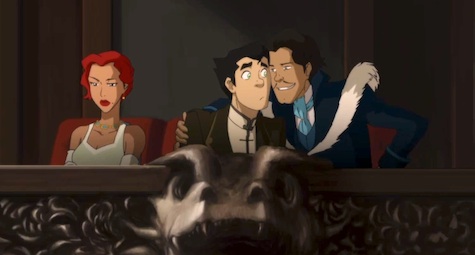
This culminates in the worst character assassination I’ve seen yet on the show, when Bolin goes off-script in a rescue scene with Ginger in order to sexually assault his co-star. For anyone who thinks that choice of words is too strong, please bear in mind that Ginger has repeatedly made very clear that she has no interest in Bolin; that he forcibly kisses Ginger while she’s tied down to a table; that in reaction, she makes an outraged noise, looks furious, and balls her hands into fists; and that while Bolin is dreamily saying “it felt so right,” she’s making a disgusted sound and walking away. Bolin later says, echoing the rhetoric of gaslighting abusers everywhere: “So, that kiss! I liked it. And it seemed like you liked it too.”
Where “The Ember Island Players” was simultaneously a summation of previous plotlines, an opportunity for the main characters to reflect on those events and examine themselves and their relationships with each other, and a wry meta-commentary on the reciprocal nature of creative work and its reception, “The Sting” is, at best, only a condemnation of propaganda and those who produce and consume it, with its greatest achievement being the successful representation of the propaganda it’s condemning. There is so little of the nuance and sophistication that made “The Ember Island Players” work as well as it did, and so much that invites the unfortunate comparison. Indeed, I’m left thinking that the newsreel frame that introduces each episode of The Legend of Korra is inadvertently commenting on the flatness of the whole: perhaps we are in fact watching a poor copy of events that took place with more complexity than we are being shown. Perhaps we are, all of us, still on Ember Island, watching middling actors lurch through one-note characterisations, insipid love triangles, and cardboard villains towards unlikely, unearned endings.
Amal El-Mohtar is the author of The Honey Month, a collection of stories and poems written to the taste of 28 different kinds of honey. She has twice received the Rhysling award for best short poem, and her short story “The Green Book” was nominated for a Nebula award. She also edits Goblin Fruit, an online quarterly dedicated to fantastical poetry. Follow her on Twitter, where she gives vent to yet more fan rage over this particular show as well as occasionally talking about cats.










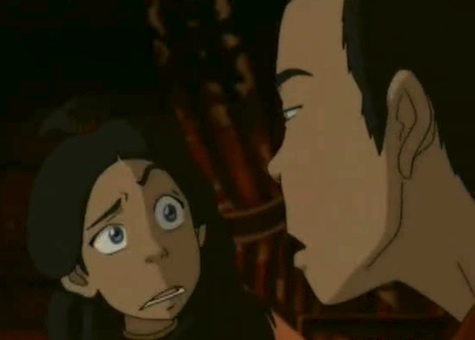
So that was an awesome review, which sucks because I’ve kinda been in denial about A:LOK from day 1. I want it to be just as good, or even better that A:TLA. I want it so much it’s hard to believe that it’s not. But so far this season has been a real let down. It’s still generally good and the animation is fantastic, but it’s nowhere near the bar its predecessor set for it in terms of story and character.
::Sigh:: I’m still on board for every episode yet to come, but my enthusiasm waning with each episode.
Wow, this is an unfair comparison. In addition to the writers having three seasons of characterization to build from to create Ember Island Players, Players and The Sting also serve very different purposes in their respective stories.
Players is a joke episode. It’s the writers taking the time to do a coda, to kick back and poke fun at themselves and the fans, in good fun. It may help the characters learn a bit about each other, but it tells the audience nothing new.
The Sting is actually about moving the plot, so it can’t be just about poking fun at it’s own characters. And Bolin’s story this year has always been about the fact that without Mako around to define him, Bolin has no self, and that he desperately needs to find one. This is illustrated by the fact that he replaces Mako and Korra on the Fire Ferrets with their cosplayers.
He doesn’t know what to do with himself, illustrated in Rebel Lights, when he asks, “What should I do?” That’s why he’s attaching himself to dominant types, he wants someone to tell him what to do.
Instead he appropriates others behaviors, like Eska’s dismissal of consent informs how he thinks he should act in regards to his feelings for Ginger, or imitating Varryk’s outlandish brush offs when telling of Mako. This is all very true and consistent to the character of Bolin that’s been established. This is the same Bolin that thought getting the tournament money by working with the Triple Threats was a good idea.
You cannot like it all you want, but to write it off as a failure of storytelling, indicates that you aren’t actually seeing the story being told.
I agree with Aeryl. If there’s one thing that the last season of Korra did, was have fans interpret things too soon before they get to see the outcome or finish of the story. Remember how so many people did not like how Korra was so defiant and only action oriented and etc… Well she is gradually learning and changing this, even through this season as well. The same goes for Bolin, who is also trying hard to come into his own. Every character is actually very flawed in Korra, more so I would say then with A:TLA, which makes the dislikes stronger for the characters. Is that good? I think so, if in the end they learn and improve as people, which they have started to do already.
And the themes are more serious and mature, so you can’t expect to be as light and clearcut as the A:TLA. I’m sure many of the themes we are seeing are going to be discussed or explored as we go.
@2 Aeryl
Took the words right out of my mouth. With Mako off being a cop and Korra off trying to save the world, Bolin is utterly lost. He has always had a dominant figure to follow, and now he doesn’t.
He latched on to Eska, and that didn’t work out well. He has latched on to Varrick, which is clearly not working out well. All of this because he has always had Mako there to tell him what to do.
I suspect that this is all part of Boin’s journey towards becoming self sufficent, and an adult. We all make mistakes, and Bolin is doing that now, trying to find his place, figure out who he is, and how to live without his brother guiding him.
Additionally, this isn’t as off character re: Bolin as a lot of people want to think. This pattern toward women is one that he has done over and over. One look at Korra in Episode 3 last season and he was “in love” with Korra. His reasons for why he and Korra should be together in Episode 5 were superficial at best (something often obscured by many people’s Mako hate). He took one look at Eska and just decided to go for it, not knowing anything at all about her. The impulsiveness toward Ginger completely matches everything he has been shown to do up until this point. I can understand not WANTING it to match what people want Bolin to be but I greatly disagree that he’s behaving out of character.
@2 and @@.-@ have this right. Bolin is struggling to grow up and find his way. He’s what–16/17? He has tons of mistakes to make this point and a long way to go still. But I am disappointed that many people seem to want to ignore past behavior that Bolin has had. It is a great deal like the people who were throwing nerd-rage fits about Eska’s onscreen behavior because it didn’t match the head canon they’d constructed for her BEFORE EVER SEEING ANYTHING ABOUT HER.
Disliking the writing/plot because it isn’t your cup of tea is completely understandable and disliking general arcs is totally cool. But Bolin has been capricious and kinda shallow in a lot of his responses to women especially from the start, usually just covered by a layer of humor. This is nothing new for the character.
I wonder if I’m the only one who sees Bolin and Ginger as an intentional gender-flip of Don Lockwood and Lina Lamont from Singin’ in the Rain. In that film, they were a popular silent movie duo on the cusp of talking pictures, and Lamont had let it go to her head, thinking that her silver screen romance with the handsome Lockwood gave her claim to him in real life. When Ginger tells Bolin he’s confusing the character with the actress, I hear the ironic echo of Gene Kelley telling Jean Reinhagen that there’s never been anything between them, just air. (Funny how when the woman hits on the man, that’s comedy, no doubt because the man is presumed to be able to “defend himself,” but when it’s the other way around it’s creepy.)
That being said, I’m not thrilled with the pacing of this season. Compared to ATLA, or even the first season of Korra, it’s all over the place. The season is almost halfway over and it barely even seems like the story’s gotten started (though boy have we had plenty of random Tenzin family character moments). That being said, they could be getting ready to surprise me with this week’s, and maybe they’re going to pull it all together in the last half. But it’s been really slow going so far.
This is just to say that I had super thorough responses to the first 4 comments all written up in this tiny box and then my laptop FROZE AND ATE THEM ALL. While I mourn my lost eloquence please know that I’m reading and appreciating your comments very much.
6. Robotech_Master: I also thought of Lina Lamont after we first heard Ginger speak, though I didn’t think of that specific relationship reversal.
My comment above is not to say that the show doesn’t have it’s flaws. For a “kid’s show” the meat of the story is too far buried, IMO. It reminds me of reading comics, having to pay too much attention to the background of the panels for story details. I’m not used to that with animation.
And apparently, no one is blinking(this isn’t an observation I’ve made, but it’s true) and the backgrounds are rather static.
I don’t have a problem with the fact that the characters are still exhibiting the same character flaws as last season, because there was no growth last season. But the fact that there wasn’t any growth is a flaw of the show.
I hope, with how much these flaws have come to the forefront, that means the writers finally intend some growth.
People keep seeing all these subtexts in the show, like Bolin having an arc about drifting directionless without an anchor. But they seem to be buried so deeply I find myself wondering if the writers are really being that clever.
I mean, if you look at the original ATLA and see what they’re capable of, you want to give them the benefit of the doubt. But this season seems to have been full of stupid thing after stupid thing. For instance, at least some characters seem to have had a big ol’ reset button pushed. Korra went from having a spiritual epiphany at the end of the first season, reaching her lowest point, meeting Aang, having the block on her airbending broken, to…being the same old thuggish Korra we knew from the first part of that season. She hasn’t communed with Aang or any other past Avatar since then that we’ve seen–even when she was directly interacting with the spirit world. Whereas Aang in the first series could hardly go anywhere, especially anywhere spirit-world-related, without some past life jumping out from behind a bush to yell “Boo!” This seems like a bit of an oversight, especially since this whole season is supposed to be dealing directly with the spirit world. Of course, this week’s episodes are going to touch directly on spiritual matters, so perhaps that will be explained, or at least remedied.
And, as I pointed out in the other discussion thread about this episode, the show seems to be having people make all sorts of stupid decisions, but signalling to the audience that those stupid decisions would actually have been the right ones.
For example, it tells us we shouldn’t like the President of the Republic, by making him out to be a photo-mugging publicity hound, right before he makes the eminently sensible from an in-universe point of view to stay out of the Water Tribe civil war. After all, it doesn’t have any direct bearing on the Republic, and given they’re just a few months past Amon’s whole coup attempt thing it’s not the best time to be rocking the boat.
And then she goes to General Iroh, who is supposed to be a responsible leader type, oath sworn to the Republic and all that–and he’s all ready to launch the fleet and “accidentally” run into the Northern Water Tribe blockade, until that annoying wet blanket of a President shows up and reminds him of his duty. What the heck? We’re supposed to root for the Republic going to war even against the wishes of its democratically-elected authority?
And then there’s the stupid pills that Lin Bei Fong seems to have been taking. “Stop barging in, rookie cop who helped save the world a few months ago! Go back to your beat and let these two obviously corrupt and/or incompetent cops handle the investigation.” Uh…yeah.
I don’t know if it’s executive meddling or what, but this season is all over the place, and some of the characters aren’t acting like they really ought to. As I said above, maybe they’ll pull it together and surprise me, but for now I’m just left shaking my head and wondering what the deal is.
Korra went from having a spiritual epiphany at the end of the first
season, reaching her lowest point, meeting Aang, having the block on her airbending broken, to…being the same old thuggish Korra we knew from the first part of that season.
Because she didn’t actually grow any last year. That’s kinda the whole point about why she hasn’t grown any, is that she got all these things last season, but none of them were earned, so she has backslid. This is actually very consistent writing, not hitting a reset button.
Whereas Aang in the first series could hardly go anywhere, especially anywhere spirit-world-related
Because Aang was in tune with the spirit world, where Korra isn’t. In addition, this show is trying to appeal to a more mature audience, as the Avatar kids are now Avatar teens, you can’t just pull too many deus ex Avatars and expect them to stay engaged.
In addition, Aang’s pacifistic nature became pivotal to the resolution of the original series, regardless of how many characters felt it was impediment, he was eventually vindicated. I think Korra’s brash aggressive nature will be similarly be vindicated. But that changes the nature of Korra’s journey.
but signalling to the audience that those stupid decisions would actually have been the right ones.
Signalling how? All the disastrous consequences of their stupid decisions were good things? Yes, Korra going after the judge was bad, even though it was initially portrayed as a good thing, it eventually provoked Unalak into outright oppressiveness. So in the end, it was signalled to be a bad move. It was a short term gain for a long term loss. Yes, Korra undermining the President was a bad thing, and if you think Iroh was doing anything more than humoring the angry, temptuous, volatile Avatar, you weren’t paying attention. And even if Iroh went along, we could ALL see that it was again, a short term gain for a long term loss, and I don’t think they show has to spell that out for us to understand.
Korra’s been on the wrong path all season long. That’s why the spirit world lashed out at her, so again, the show has signalled her behavior was bad.
I’ve got nothing but applause for Bei Fong, and I think all this stuff that the cops are up to no good is a giant misdirect. They are acting like cops act, which is impatient with rookies telling them how to do their jobs, especially when they are operating with more information than Mako probably has. Mako is wrong, his sting was a terrible idea, Bei Fong was right to tell him off, especially after he brought in civilians!
Well, for one thing, it’s hinting strongly at us that the President is a no-goodnik, by having the very first we see of him be him snagging a photo opportunity. For another, the two cops are being painted as similarly no good by their behavior: intentionally setting Mako up to get yelled at, and shoving his “evidence” into a drawer and making no apparent attempts to follow up on it. Since everything has to be drawn, nothing is an accident; they’re very carefully using cinematic conventions we are all familiar with to paint the Mustachioed Duo as not “by the book” cops (which would have an entirely different set of conventions—the ones Lin Bei Fong partook of last season, in fact), but as sleaze. And as canny as Lin has been in the past, it seems unlikely she would be one to disregard any potential evidence no matter who presented it.
And when I watch the scene again, I don’t see Iroh “humoring” Korra. His bearing, expression, and delivery are dead serious. If he was just “humoring” her, there would have been a signal to the audience. As we’ve seen plenty of times characters, especially villains like Zhao or Azula, have said one thing and meant another previously in this show.
And what, apart from having to use mobsters for it, was such a bad idea about Mako’s sting operation? If he’d gotten the cops to go along, or even been able to use security forces provided by Asami’s company (why on earth doesn’t she seem to have any other employees except herself, anyway? A company the size of Future Industries ought to have its own private police force of security guards), and, more importantly, not had Varrick the fox guarding the henhouse, it might very well have worked.
I don’t think the writers are capable of that degree of misdirection. Or that they would use it in what is ostensibly a kids’ show. We’ll just have to wait and see.
Honestly, I suspect that the Asami’s employee question is actually pretty simple to answer.
Her dad tried to overthrow a government. I think Future Industires has had to do a lot of downsizing.
Odds are, she doesn’t have very many employees left. The folks that work the assembly lines aren’t going to do very good security, and I figure she doesn’t have the money left to pay actual security personnel.
Even if some of her factory workers were guarding the warehouse, a bunch of dudes show up and offer them either money or a butt kicking to vanish, they are going to vanish.
After all, she did say that what was in that warehouse was all she had left. That does not speak well as to the state of Future Industries at the moment.
I pointed out what I think is up with Lin and the Mustache Team in the review of the last episode, too.
Now I’m just waiting to find out if Varrick is up to what I think he is, and if Unalaq is trying to replace Korra as the Avatar. Next episode should answer a lot of questions.
Much simpler would have been to ride along on the next shipment of Varryck’s. No Triple Threats, just observing to determine who the attackers are, maybe try to take one prisoner.
I saw Iroh acting in a manner of “How do I tell the Avatar who saved my life, no?”
And apparently a politician acting like a politician(photo opportunity) is supposed to inidicate he’s a bad guy now? Whatever.
And an even better plan for security backup would have been some of Amon’s former Equalists. They have experience fighting benders, just have Asami equip them with gloves, and done.
As far as Lin and the cops, it’s far more likely Mako is stomping all over THEIR investigation, because he’s a rookie beat cop and not told about all of the department’s ongoing investigations. This show has always flipped tropes on their heads, like Katara’s speech to the imprisoned Earthbenders. What’s more likely, is that it’ll be revealed they were working the same angle as Mako, and they’ll probably pop up and save Mako’s bacon when he makes another dumb move.
The series has disappointed me beyond words. Korra is an angsty failure of an avatar, useless and weaker than any other character in the entire universe. She can’t even use her own element, water, better than anyone else. Nothing has any sort of weight, with a convenient answer to literally anything the writers can throw up, most of the time being an “Oh wait, I wrote the story so I can just make it entirely inconsequential” sort of thing. Characters switch sides at the drop of a hat, plot devices pop up in every wrinkle, and every single element basically looks like their benders are just throwing punches. The writers could have had a preschooler type up a script and it would have had more depth and better characters than the utter disappointment they wrote into existence. I hope they have thrown themselves into an abyss so dark and so deep that they will never see the light of day and never be able to write such a miserable failure ever again.
What did you expect Aaron Ehasz isn’ t the head writer of the show (as opposed to ATLA) and it’s clearly visible when we see how the mythology and wonderful complexity of ATLA is slowly being destroyed episodes by episodes in LoK
Well, I think there might be one knowing that you miss to understand that the twist od Bolin into the Nuktuk character is beautiful and inteligent. I didn’t read all of the previus comments, so I don’t know if someone already meantioned this. What The Legend of Korra does, following The Legend Of Aang, is retell the history of our world. Many people find great similarities between the series and China’s past disnasty history. But this time, in Korra, Modernity as a whole is explored: the industry, capitalism, serious law and diplomatic challenges, and my personal favorite, the greatest invention of all time: cinema. The Legend of Korra’s creators have pleadge a gread deal amount of homage to the History of cinema. What exemplifies my point of view is the movie Birth of a Nation, by D.W. Griffith, from 1915. For does who don’t know, the movie adresses the U.S. Civil War, in a way that creates a horrible propaganda against black people. In the movie there’s also a scene which recreates Abraham Lincon’s assassination, and then again is very similar to what happen’s during the final exhibition of Nuktuk’s show. Oh! And again, Nuktuk… For me, it clearly rings a bell with Nanuk of the North, the world’s first documentary, about the inuits in the North. I just feel that The Legend of Korra is so rich, full of well built references, does a great job adressing war issue… Of course, I did feel a weakining on the character’s developmente, but I don’t know if I should judge it worser than Aang adventure, it’s just a different time, and a different story. Much like our history, some of the poetry of life starts dying.